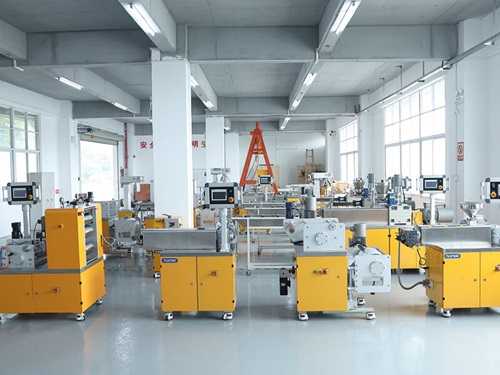A Lab Spinning Machine is a specialized device used to produce films from various materials through a spinning process. This technique involves extruding a polymer solution or melt through a spinneret to form continuous filaments or films. The machine can control parameters such as temperature, speed, and viscosity, allowing for the creation of materials with specific characteristics.
Key Types of Lab Spinning Machine
- Wet Spinning Machines: These machines use a liquid spinning process, where the polymer is dissolved in a solvent. The solution is extruded into a coagulation bath, where the fibres are formed. Wet spinning is commonly used for producing materials like viscose and lyocell.
- Dry Spinning Machines: In this method, the polymer solution is extruded into warm air, causing the solvent to evaporate and leaving behind solid fibres. Dry spinning is often employed for synthetic fibres such as acetate and nylon.
- Electrospinning Machines: Electrospinning uses an electric field to draw a polymer solution into fine fibres. This technique is ideal for producing nanofibers with high surface area and specific structural properties, making it popular in biomedical applications.
- Melt Spinning Machines: These machines extrude molten polymers through a spinneret. As the material cools, it solidifies into fibres. Melt spinning is commonly used for producing polyester and polypropylene fibres.
Applications of Lab Spinning Machine
- Textile Industry: Lab spinning machine are essential in the development of new fabrics and textiles. They enable researchers to experiment with different polymer blends and spinning conditions to create innovative materials.
- Biomedical Research: In the field of medicine, lab spinning machines are used to create scaffolds for tissue engineering, drug delivery systems, and wound dressings. The ability to produce nanofibers enhances the functionality and effectiveness of these applications.
- Composite Materials: Researchers utilize lab spinning machines to develop composite materials with enhanced properties, such as increased strength, flexibility, and resistance to environmental factors.
- Environmental Applications: Lab spinning machines can produce filtration membranes and materials for environmental remediation, helping to address pollution and water purification challenges.
Benefits of Using Lab Spinning Machine
- Precision Control: Lab spinning machines offer precise control over process parameters, allowing researchers to tailor the properties of the produced films to meet specific requirements.
- Versatility: These machines can handle a wide range of polymers and materials, making them adaptable for various research and industrial applications.
- Innovative Material Development: With the ability to experiment with different spinning methods and materials, lab spinning machines facilitate the development of innovative products that can lead to breakthroughs in various fields.
- Scalability: The processes developed in the lab can often be scaled up for industrial production, making lab spinning machines a critical step in material innovation.
Conclusion
Lab Spinning Machine are at the forefront of material processing technology, providing researchers and engineers with the tools needed to develop advanced fibres and films. Their versatility, precision, and ability to produce tailored materials make them invaluable in a wide range of applications, from textiles to biomedical engineering. As industries continue to evolve and the demand for innovative materials increases, lab spinning machines will play a crucial role in driving research and development forward. Embracing this technology opens doors to new possibilities in material science, paving the way for a sustainable and advanced future.





Comments